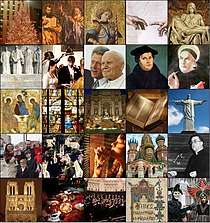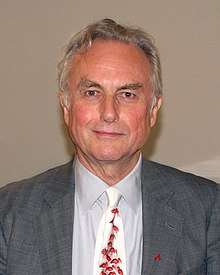Cultural Christian
Cultural Christians are deists, pantheists, agnostics, and atheists who adhere to Christian values and appreciate Christian culture. This kind of identification may be due to various factors, such as family background, personal experiences, and the social and cultural environment in which they grew up.[1]
| Part of a series on |
| Christian culture |
|---|
 |
|
|
| Christianity portal |
Contrasting terms are "biblical Christian",[2] "committed Christian",[3] or "believing Christian".[4]
The term "Cultural Christian" may be specified further by Christian denomination, e.g. "Cultural Catholic" or "Cultural Anglican".[5][6]
Usage
Early modern period
Deists of the 18th and early 19th centuries include Napoleon, as well as Thomas Jefferson, a Founding Father of the United States who considered himself part of Christian culture, despite his doubts about the divinity of Jesus.[7][8][9][10][11]
Modern Europe

In the 21st century, outspoken British atheist Richard Dawkins has described himself in several interviews as a "cultural Christian" and a "cultural Anglican".[16][17][6][18]
The President of Belarus, Aleksandr Lukashenko, has also identified as cultural Christian calling himself an "Orthodox atheist" in one of his interviews.[19]
The President of France, Emmanuel Macron, identified himself as an "Agnostic Catholic".[20][21]
The Netherlands
The provinces North Brabant and Limburg in the Netherlands are historically mostly Roman Catholic, therefore many of their people still use the term and some traditions as a base for their cultural identity rather than as a religious identity. Since the War of Independence the Catholics were systematically and officially discriminated against by the Protestant government until the second half of the 20th century, which had a major influence on the economical and cultural development of the southern part of the Netherlands.
From the Reformation to the 20th century, Dutch Catholics were largely confined to certain southern areas in the Netherlands, and they still tend to form a majority or large minority of the population in the southern provinces of the Netherlands, North Brabant and Limburg.
However, with modern population shifts and increasing secularization, these areas tend to be less and less religious Catholic. Since 1960 the emphasis on many Catholic concepts including hell, the devil, sinning and Catholic traditions like confession, kneeling, the teaching of catechism and having the hostia placed on the tongue by the priest rapidly disappeared, and these concepts are nowadays seldom or not at all found in modern Dutch Catholicism. The southern area still has original Catholic traditions including Carnival, pilgrimages, rituals like lighting candles for special occasions and field chapels and crucifixes in the landscape, giving the southern part of the Netherlands a distinctive Catholic atmosphere, with which the population identifies in contrast to the rest of the Netherlands. The vast majority of the (self-identifying) Catholic population in the Netherlands is now largely irreligious in practice. Research among Catholics in the Netherlands in 2007 shows that only 27% of the Dutch Catholics can be regarded as theist, 55% as ietsist /agnostic/deist and 17% as atheist.[22]
China
In China, the term "Cultural Christian" can refer to intellectuals, openly religious or otherwise, who are devoted to Christian theology, ethics and literature, and often contribute to a movement known as Sino-Christian theology.
Traditionally, Christianity has been considered a "foreign religion" (Chinese: 洋教; pinyin: yáng jiào, means non-local religions) in China, including all the negative connotations of foreignness common in China. This attitude only started to change at the end of the 20th century. In China, the term "Cultural Christians" (Chinese: 文化基督徒; pinyin: wénhuà jīdūtú) can refer to Chinese intellectuals devoted to the study of Christian theology, ethics, and literature, and often contribute to a movement known as Sino-Christian theology. Some of the earliest figures in this movement in the late-1980s and 1990s, such as Liu Xiaofeng and He Guanghu, were sympathetic to Christianity but chose not to associate with any local church.[23] Since the 1990s, a newer generation of these Cultural Christians have been more willing to associate with local churches, and have often drawn on Calvinist theology.[24][25]
See also
- Apatheism
- Backsliding
- Cafeteria Christianity
- Christian atheism
- Christian agnosticism
- Christian culture
- Christian deism
- Christian Identity
- Christian value
- Cultural Judaism
- Cultural Mormon
- Cultural Muslim
- Lapsed Catholic
- Nominal Christian
- Rice Christian
- Sunday Christian
References
- James D. Mallory, Stanley C. Baldwin, The kink and I: a psychiatrist's guide to untwisted living, 1973, p. 64
- Patrick Morley, The Man in the Mirror: Solving the 24 Problems Men Face (1997), Biblical Christian or Cultural Christian?
- Richard W. Rousseau, Christianity and Judaism: the deepening dialogue (1983), p. 112
- Postmodern theology: Christian faith in a pluralist world, Harper & Row, 1989 . Joseph C. Aldrich, Life-style evangelism: crossing traditional boundaries to reach the unbelieving world , 1983
- Rachel Zoll, What would 'cultural Catholic' Sotomayor mean for Supreme Court?, Associated Press, 6/3/2009
- Stoyan Zaimov (4 March 2013). "Richard Dawkins: I Guess I'm a Cultural Christian". Christian Post. Retrieved 5 March 2013.
- Jayne, Allen (2000), Jefferson's Declaration of Independence: Origins, Philosophy and Theology traces TJ's sources and emphasizes his incorporation of Deist theology into the Declaration.
- Franklin, Benjamin (1958) [1771]. Autobiography and other writings. Cambridge: Riverside. p. 52.
- Olson, Roger (19 October 2009). The Mosaic of Christian Belief: Twenty Centuries of Unity and Diversity. InterVarsity Press.
Other Deists and natural religionists who considered themselves Christians in some sense of the word included Thomas Jefferson and Benjamin Franklin.
- Boller, Paul F (1996), Not so!: popular myths about America from Columbus to Clinton, p. 31
- Boller, Paul F (1963), George Washington & religion, Google Books, p. 16, retrieved 5 March 2011,
...the father of his country... died as he had lived, in dignity and peace; but he left behind him not one word to warrant the belief that he was other than a sincere deist
- "Dawkins: I'm a cultural Christian". BBC News. 10 December 2007. Retrieved 1 March 2008.
- "Q&A with Richard Dawkins: 'I guess I'm a cultural Christian'". Charleston City Paper. 4 March 2013. Retrieved 4 March 2013.
- "Richard Dawkins: I Guess I'm a Cultural Christian". Christian Post. 4 March 2013. Retrieved 5 March 2013.
- The God Delusion, page 284
- "Dawkins: I'm a cultural Christian". BBC News. 10 December 2007. Retrieved 1 March 2008.
- "Q&A with Richard Dawkins: 'I guess I'm a cultural Christian'". Charleston City Paper. 4 March 2013. Retrieved 4 March 2013.
- Richard Dawkins calls himself a Cultural Christian!. YouTube. Retrieved on 2009-04-07.
- "Belarus president visits Vatican". BBC News. 27 April 2009. Retrieved 26 June 2010.
- https://www.catholicnewsagency.com/news/frances-new-president-is-a-zombie-catholic-41556
- "Meeting with Pope puts Macron's religious views in spotlight". The Local. 25 June 2018.
- God in Nederland' (1996-2006), by Ronald Meester, G. Dekker, ISBN 9789025957407
- Fällman, Fredrik (2008). "Hermeneutical conflict? Reading the Bible in Contemporary China". In Starr, Chloë F. (ed.). Reading Christian Scriptures in China. New York: T & T Clark. pp. 49–60. ISBN 978-0567638465.
- Fällman, Fredrik (2013). "Calvin, Culture and Christ? Developments of Faith Among Chinese Intellectuals". In Lim, Francis Khek Gee (ed.). Christianity in Contemporary China: Socio-cultural Perspectives. London: Routledge. pp. 153–168. ISBN 978-0415528467.
- Chow, Alexander (2014). "Calvinist Public Theology in Urban China Today". International Journal of Public Theology. 8 (2): 158–175. doi:10.1163/15697320-12341340.
External links
- Tricia C. Bruce, Cultural Catholics in the United States. Annual Review of the Sociology of Religion, Volume 9, 2018.
- David Masci, Who are ‘cultural Catholics’?, Pew Research Center. 3 September 2015.
- Mark Bauerlein, Cultural Catholics. First Things, 29 March 2019.
- Ireland and the End of Cultural Catholicism, Catholic World Report, 28 May 2018.